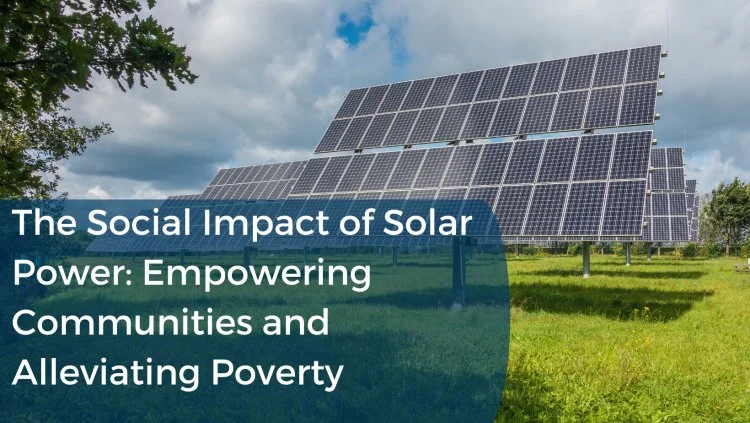The Social Impact of Solar Power: Empowering Communities and Alleviating Poverty
Discover the social impact of solar power: empowering communities, creating jobs, and alleviating poverty. Explore the transformative role of utility-scale solar and sustainable energy solutions in a cleaner, more inclusive future.

In recent years, the global shift towards sustainable and clean energy sources has gained momentum, with solar power emerging as a frontrunner in the race to combat climate change. Beyond its environmental benefits, solar power has a profound social impact, particularly in empowering communities and alleviating poverty. This article explores the transformative effects of solar power, focusing on utility-scale solar projects and the role of sustainable energy solutions companies.
Utility Scale Solar: A Catalyst for Change
Utility-scale solar projects are large-scale installations that generate electricity to be fed into the grid, serving entire communities or regions. These projects harness the power of the sun through photovoltaic panels, converting sunlight into a clean and renewable source of energy. The scale of utility solar allows for significant energy production, making it a crucial player in meeting the rising demand for sustainable power.
One of the key social impacts of utility-scale solar is its ability to provide reliable and affordable electricity to underserved and remote communities. In many parts of the world, especially in developing regions, access to electricity is limited or nonexistent. Utility-scale solar projects bridge this gap, bringing power to areas where traditional energy infrastructure may be impractical or financially unviable.
Empowering Communities Through Solar
The deployment of utility-scale solar projects goes beyond mere electrification; it empowers communities in various ways. One notable aspect is the creation of local job opportunities. The planning, construction, and maintenance of solar installations require skilled and unskilled labor, providing employment opportunities for the local population. This not only stimulates economic growth but also enhances the skill sets of community members, contributing to long-term sustainability.
Moreover, solar power can be harnessed for community-owned microgrids, allowing residents to take control of their energy production and consumption. Community-owned solar initiatives foster a sense of ownership and self-reliance, reducing dependence on centralized power systems. As a result, communities can become more resilient in the face of energy challenges and fluctuations.
Alleviating Poverty Through Sustainable Energy Solutions
The impact of solar power extends beyond individual communities to address broader issues such as poverty alleviation. Sustainable energy solutions companies play a pivotal role in driving the adoption of solar power by providing expertise, financing, and technology. These companies collaborate with governments, NGOs, and local communities to implement solar projects that not only generate electricity but also contribute to socio-economic development.
One of the ways in which sustainable energy solutions companies alleviate poverty is through the promotion of energy access for small businesses. By providing affordable and reliable electricity, solar power enables the growth of local enterprises, fostering economic development and job creation. This, in turn, contributes to poverty reduction by empowering individuals and communities to improve their economic prospects.
Additionally, the transition to solar power can lead to a reduction in household energy expenses. In many developing regions, low-income families spend a significant portion of their income on fuel for generators or kerosene lamps. Solar power offers a cost-effective and sustainable alternative, freeing up financial resources that can be directed towards education, healthcare, and other essential needs.
Conclusion
The social impact of solar power, particularly through utility-scale projects and the efforts of sustainable energy solutions companies, is a testament to the transformative potential of clean energy. By providing electricity to underserved communities, creating local job opportunities, and alleviating poverty through economic empowerment, solar power emerges not only as an environmental solution but also as a catalyst for positive social change. As we continue to embrace sustainable energy, it is crucial to recognize and amplify the role of solar power in building a more inclusive and resilient world.
What's Your Reaction?

































